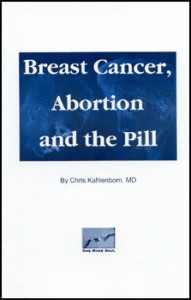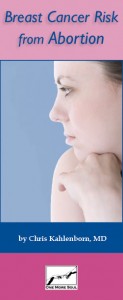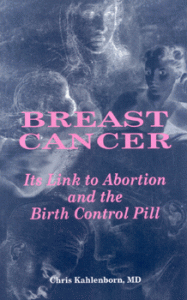The month of October is Breast Cancer Awareness Month. This is an annual campaign that began in 1991 to raise awareness about this disease. Although the campaign promotes regular self-breast exams, doctor visits, annual mammograms, and provides data on recurrence, preventable risk factors for breast cancer are not emphasized.
What are the risk factors for breast cancer?
According to the National Cancer Institute, the risk factors for breast cancer include: older age, genetic abnormalities, hormonal therapy, radiation therapy to the chest, alcohol and obesity. Although it has been demonstrated that hormonal contraceptive use increases breast cancer risk, this risk factor is virtually ignored during the campaign.
Synthetic estrogen was classified by the World Health Organization in 2005 as “Group 1 carcinogen”. Hormonal contraceptives contain synthetic estrogen and increase the risk of not only breast cancer, but also liver and cervical cancer. According to a meta-analysis published in the Mayo Clinic journal, women who have used hormonal contraceptives for four years before first full-term pregnancy, have an increase of 52% in breast cancer risk.
Another study funded by the National Institutes of Health found that the use of oral contraceptives for one year or more was associated with a 4.2-fold increased risk of triple-negative breast cancer for women 40 and under.
Another preventable risk factor that is not mentioned in the breast cancer awareness campaign is that due to induced abortion. Recent studies published in India and Bangladesh; report that induced abortion increases the risk of breast cancer 6-20 times in these populations. Although 53 studies (out of 73 worldwide) confirm the association between breast cancer and induced abortion, medical and government organizations continue to claim otherwise.
It is known that induced abortion in the first trimester of pregnancy alters the maturation of cells in the breast, which may trigger the development of cancer cells. Full term birth and lactation, mature breast cells and help to protect women from breast cancer.
How common is the problem of Breast Cancer?
Breast cancer is the most common cancer in women worldwide. In the U.S, 1 in 8 women have the chance of developing this cancer. According to statistics reported by the CDC, 211,731 women were diagnosed with breast cancer in the United States during 2011. Of those women 40,676 women died from this cancer resulting in one death for every five cases diagnosed. In some countries, this cancer survival ratio is lower. For example in India, 115,000 new cases of breast cancer were reported along with 53,000 deaths from this cause in 2008. In this case, there was one death for two newly-diagnosed cases.
Can breast cancer be prevented?
There are some breast cancer risk factors that you cannot modify such as age, being a female and the genetic predisposition. Some lifestyle changes could reduce the breast cancer risk. Regular exercise, healthy diet, and avoiding smoking, alcohol consumption, and radiation therapy on the chest may reduce the risk of the disease.
Another important measure to decrease the breast cancer risk is to avoid the use of potent steroids in hormonal birth control and hormonal replacement therapy (HRT). Natural family planning is a safe, healthy, and effective way to plan your family. Having children, and breastfeeding them offer an additional protection against breast cancer. There are alternatives to HRT such as bio-identical hormones and natural therapies. For single women, abstinence is the only way to prevent unwanted pregnancies and abortion.
One More Soul joins Breast Cancer Awareness Campaign to educate women and girls about the link between hormonal contraception, abortion and breast cancer. Visit our online store to see the wonderful resources we have on this subject. Please consider ordering some of our brochures and books for yourself or to share with your family, doctors, and friends about these preventable risk factors for a disease that is becoming epidemic.
One More Soul Resources:

Breast Cancer, Abortion and the Pill booklet presents the summary, conclusions, and recommendations from Chapter 17 of Dr. Kahlenborn’s book Breast Cancer, Its Link to Abortion and the Birth Control Pill. This is a great resource for explaining just how dangerous abortion and contraceptive pills are.

This pamphlet presents information from the book Breast Cancer, It’s Link to Abortion and the Birth Control Pill, in a short and highly persuasive format. From the time it was first published we have received letters and phone calls about babies saved from abortion when their mothers read this pamphlet and the number continues to grow. Praise God!!. – See more at:
https://onemoresoul.com/catalog/breast-cancer-risk-from-abortion-p321.html

Based on six years of study and a meticulous analysis of hundreds of scientific papers and other sources, Dr. Chris Kahlenborn documents the effect that abortion and hormonal contraception have on breast cancer, as well as uterine, cervical, liver, and other cancers, and even the transmission of AIDS! Hormonal contraceptive use before first full term pregnancy is found to increase risk of breast cancer by at least 40%. The book gives special attention to black women, to various populations of the world, and to effective steps for prevention. This is a very timely and powerful work. –
Revised and updated. How the Pill increases the risk of breast cancer, and effective strategies for prevention. Women who take contraceptive pills before their first full pregnancy are 44% more likely to develop breast cancer before menopause. This is a real eye opener for people who thought the Pill was harmless. – See more at:
https://onemoresoul.com/catalog/the-pill-and-breast-cancer-p711.html
This entry was posted
on Wednesday, October 14th, 2015 at 6:49 pm and is filed under News & Commentary.
You can follow any responses to this entry through the RSS 2.0 feed.
You can skip to the end and leave a response. Pinging is currently not allowed.
Ignoring a Breast Cancer Link
The month of October is Breast Cancer Awareness Month. This is an annual campaign that began in 1991 to raise awareness about this disease. Although the campaign promotes regular self-breast exams, doctor visits, annual mammograms, and provides data on recurrence, preventable risk factors for breast cancer are not emphasized.
What are the risk factors for breast cancer?
According to the National Cancer Institute, the risk factors for breast cancer include: older age, genetic abnormalities, hormonal therapy, radiation therapy to the chest, alcohol and obesity. Although it has been demonstrated that hormonal contraceptive use increases breast cancer risk, this risk factor is virtually ignored during the campaign.
Synthetic estrogen was classified by the World Health Organization in 2005 as “Group 1 carcinogen”. Hormonal contraceptives contain synthetic estrogen and increase the risk of not only breast cancer, but also liver and cervical cancer. According to a meta-analysis published in the Mayo Clinic journal, women who have used hormonal contraceptives for four years before first full-term pregnancy, have an increase of 52% in breast cancer risk.
Another study funded by the National Institutes of Health found that the use of oral contraceptives for one year or more was associated with a 4.2-fold increased risk of triple-negative breast cancer for women 40 and under.
Another preventable risk factor that is not mentioned in the breast cancer awareness campaign is that due to induced abortion. Recent studies published in India and Bangladesh; report that induced abortion increases the risk of breast cancer 6-20 times in these populations. Although 53 studies (out of 73 worldwide) confirm the association between breast cancer and induced abortion, medical and government organizations continue to claim otherwise.
It is known that induced abortion in the first trimester of pregnancy alters the maturation of cells in the breast, which may trigger the development of cancer cells. Full term birth and lactation, mature breast cells and help to protect women from breast cancer.
How common is the problem of Breast Cancer?
Breast cancer is the most common cancer in women worldwide. In the U.S, 1 in 8 women have the chance of developing this cancer. According to statistics reported by the CDC, 211,731 women were diagnosed with breast cancer in the United States during 2011. Of those women 40,676 women died from this cancer resulting in one death for every five cases diagnosed. In some countries, this cancer survival ratio is lower. For example in India, 115,000 new cases of breast cancer were reported along with 53,000 deaths from this cause in 2008. In this case, there was one death for two newly-diagnosed cases.
Can breast cancer be prevented?
There are some breast cancer risk factors that you cannot modify such as age, being a female and the genetic predisposition. Some lifestyle changes could reduce the breast cancer risk. Regular exercise, healthy diet, and avoiding smoking, alcohol consumption, and radiation therapy on the chest may reduce the risk of the disease.
Another important measure to decrease the breast cancer risk is to avoid the use of potent steroids in hormonal birth control and hormonal replacement therapy (HRT). Natural family planning is a safe, healthy, and effective way to plan your family. Having children, and breastfeeding them offer an additional protection against breast cancer. There are alternatives to HRT such as bio-identical hormones and natural therapies. For single women, abstinence is the only way to prevent unwanted pregnancies and abortion.
One More Soul joins Breast Cancer Awareness Campaign to educate women and girls about the link between hormonal contraception, abortion and breast cancer. Visit our online store to see the wonderful resources we have on this subject. Please consider ordering some of our brochures and books for yourself or to share with your family, doctors, and friends about these preventable risk factors for a disease that is becoming epidemic.
One More Soul Resources:
This entry was posted on Wednesday, October 14th, 2015 at 6:49 pm and is filed under News & Commentary. You can follow any responses to this entry through the RSS 2.0 feed. You can skip to the end and leave a response. Pinging is currently not allowed.